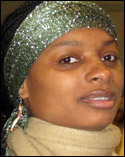From false leads to street thugs, field research has its challenges along with its joys
Recovering from a street mugging, Human Rights Center summer fellow Ugo Edu reflects on her time researching women’s reproductive choices in Brazil.
August 30, 2010
SALVADOR, BRAZIL — Rain was pouring down, making it more difficult to tell whether the knife pointed at my neck was real, and whether it was as deadly as the razor-sharp teeth protruding from my drugged-up attacker’s mouth. He wanted my black bag, the one I’d borrowed from my brother, which held two cameras, my iPod and cell phone, an audio recorder with a still-untranscribed interview, a flash drive, my notebook (full of field notes and an interview transcription) — among many other things. My initial reaction was to resist his demand. But a menacing thrust of the knife toward my neck, and the realization that he might be accompanied by a second attacker, quickly brought me to my senses. I gave him the bag. He took off running, as did I — after grabbing a huge rock to throw at his head. But he was gone and so were my things, I thought, as I ran back to enlist the help of the police.

Each year the UC Berkeley-based Human Rights Center awards summer fellowships to students from University of California campuses, to enable them to work with human-rights organizations in the U.S. and abroad. Three current Human Rights Fellows including Ugo Edu — a graduate student enrolled in the UCB-UCSF Joint Medical Program — have agreed to share their experiences this summer, with regular updates from the field to be published on the NewsCenter. This is Edu’s final post of the summer.
 Ugo Edu on reproductive choice in Brazil
Ugo Edu on reproductive choice in Brazil
- Watching girl-watchers in a Brazilian airport
- An arduous journey and some food for thought
- Trading votes for sterilizations, a common political tool in northeast Brazil
- Technology troubles, informal conversations, and a curious fact
- From false leads to street thugs, field research has its challenges along with its joys
Despite this turn of events, I can say that I have had a very full research experience this summer. I’ve chosen to share, in this online journal, some of the difficulties I’ve encountered as part of the my research — missed appointments, wrong directions, misunderstandings, delayed reactions, leads to nowhere, a chock-full schedule, technology malfunctions, and now a robbery — aspects of field research that I’ve always wondered about but not been privy to. I hope my account has been helpful, interesting, and illuminating. (You can learn about my successes in my final project description, as well as at the Human Rights Center conference in November.)
As I reflect on my experience, which is yet to come to an end, I am learning many things — like the trials and tribulations of being a field researcher or a medical anthropologist. Seemingly false leads, for instance, have proved illuminating. Even my robbery had its up side — as it helped me realize I was feeling too comfortable and not paying close enough attention to my surroundings.
Part of this experience, for which I am grateful, has been to trust my intuition and the value of my research and the numerous complex issues I am trying to explore and understand — such what it means to apply a human-rights framework. What does it mean to exercise one’s rights? And what are the consequences of doing so? The day I was robbed, was I not exercising my right to carry items necessary to my research? (Some might argue, as well, that my attackers were exercising their “right” to steal my belongings). A young woman exercising her right to choose with whom, when, and the frequency of her sexual encounters also has the right to embrace and analyze the consequences of her choices. It has been interesting hearing everyday women discuss “reproductive rights,” without using those particular words.
In my last week and few days, I will be bustling to fit in long-postponed interviews, follow up with people who haven’t responded to my attempts to reach them, and make a list of future contacts. And I still need to sit down and analyze my findings. I feel very grateful to have had the chance to approach my research within the framework of human rights. I look forward to discussing reproductive choice within the context of rights, representation, and agency, and to think about all the other issues stirred by this experience.
About Ugo Edu

Ugo Edu was born and raised in southern California, the oldest daughter of Nigerian immigrants. After receiving her B.S. in physiological sciences at UCLA, her interest in medicine led her to earn a master’s of public health at Morehouse School of Medicine.
Edu wasn’t satisfied, however, with a strictly public-health approach to questions of sickness, healing, and prevention. Instead, personal experiences — and those of African Americans and of fellow children of African immigrants living in the U.S. — nurtured her interest in a medical anthropological approach to such issues. She is currently entering her third year as a medical anthropology PhD student enrolled in the UCB-UCSF Joint Medical Program.
Edu, 29, has a particular interest in Brazil, in part due to its international geopolitical and economic position; her summer research focuses on Brazilian women’s reproductive choices. She trains in Capoeira Angola, the traditional style of the art form.

